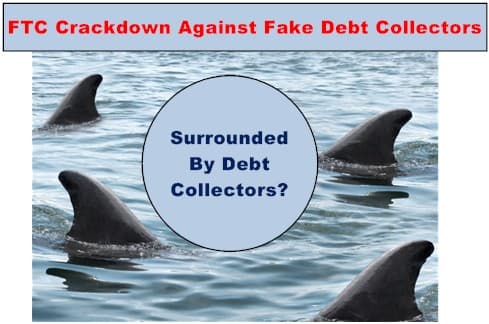FTC Pursues Fake Debt Collectors
- Debt Collectors must act fairly.
- Don't succumb to harassment.
- Learn to deal with the collectors, and more importantly with your debt.
- Start your FREE debt assessment
Fake Debt Collectors - Don't Be Intimidated
We have all read about debt collection scams and harassment by fake debt collectors. The Federal Trade Commission (FTC), a government regulator and enforcer of consumer rights, recently settled a claim against a bogus debt collection scam.
The case against a California based resident, who worked with fake debt collector callers from India, is just another case of the FTC crackdown against scams that targeted financially distressed consumers.
FTC Settles with Fake Debt Collectors
The FTC released a press release on October 2012 about a crackdown on fake debt collectors. The latest scam involved a group of people who used information about consumers who had either taken a payday loan or shown an interest in taking out a payday loan.
The FTC noted that, in this latest case, consumers received millions of collection calls that originated in India. The fake debt collectors raked in more than $5 million over a two-year period. The FTC and state attorneys received more than 4,000 complaints.
According to a FTC press release, the fake debt collectors used different tactics, including:
- Misrepresenting themselves as law enforcement officers or other government officials.
- Threatening to “immediately arrest and jail consumers if they did not agree to make a payment.”
- Claiming to be making large lawsuits and demand sums ranging from $300-$2,000.
- Threatening to have the consumer fired from his job if they didn’t pay immediately.
All of those tactics are illegal. They are also common tactics used by fake or dishonest debt collectors.
Tip
To learn about your consumer rights and debt collectors obligations, read the Bills.com article about The Fair Debt Collection Practices Act (FDCPA).
Fake Debt Collectors and Dealing with Debt
It is not coincidental that the latest scam involved consumer who looked into payday loans. Scammers seek out the most vulnerable consumers. Payday loans are a sign that a consumer is having a tough time making ends meet.
Many consumers have mounting debt and have trouble making their monthly payments. Stopgap measures, such as payday loans, do not solve financial problems. Usually payday loans are like adding fuel to the fire, and make matters worse. Instead of solving financial problems, they add more debt then needs to be paid off immediately.
Quick Tip #1
If you are having debt problems and looking for a solution that fits your financial situation, then check out Bills.com innovative tool, the Debt Coach.
If your are late in your payments, debt has been charged-off, or you are facing possible legal action, then dealing with debt involves a two-fold approach:
- Deal with Debt Collectors: Being in debt is stressful. If you have reached the stage where creditors are sending you letters, making calls or suing you, then make sure that you protect yourself. Here are some steps to take when dealing with debt collectors:
- Verify the debt: Make sure that you verify you actually owe the debt.
- Avoid harassment: Debt collectors have to act fairly, follow the FDCPA, and are forbidden to threaten or harass you. Learn about your rights and if you are being subject to unfair practices, then file a complaint with the FTC.
- Deal with lawsuits: If you are being sued and served with a complaint, then do not ignore the legal papers. Read the Bills.com article about summons and complaint and do not hesitate to seek legal assistance from a lawyer specializing in personal consumer law.
- Deal with your Debt: In order to solve your debt problems you will need to build a game plan suited to your financial situation. Unless you have money to pay off your creditors (and don’t pay off bogus debts), you will need to find a debt relief solution. Here are some steps you should take:
- Make a financial plan. Create a budget so you can control your monthly expenses.
- Seek out a debt relief solution that fits your financial situation, ranging from a debt consolidation loan, credit counseling, debt settlement, to filing for bankruptcy.
The FTC Crackdown on Bogus Debt Collectors
The latest FTC crackdown is a reminder to us that there are debt scammers and unscrupulous debt collectors. It is important that you learn your rights and verify your debts.
Debt collectors do have the right to collect legitimate debts. They can contact you, send letters, and make calls. However, they must ask fairly and within the limits of the law. Anytime that a debt collector threatens you or harasses you, demand that they cease communication with you, and file a complaint with the FTC.
Whenever you are over your head with debt or legal problems, seek professional advice.
Quick Tip #2
Do you have debt problems? Get a free consultation from a Bills.com debt relief provider.
Free up cash each month with Freedom Debt Relief

Ozzy S., Freedom client
“Right away, I had more money each month because of program costs so much less than what I was paying on my minimums.”
Actual client of Freedom Debt Relief. Client’s endorsement is a paid testimonial. Individual results are not typical and will vary.

